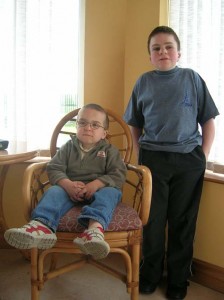
Hurler, Scheie and Hurler/Scheie Disease are forms of Mucopolysaccharidosis Type 1 and are also known respectively as MPS IH, IS and IHS.
MPS I covers a wide spectrum of severity of symptoms. For convenience, children most severely affected are said to have Hurler disease. Individuals with Scheie Disease are those who are of normal intelligence and who live into adult life. Those with normal or near-normal intelligence but with more severe physical symptoms than Scheie patients are known as Hurler Scheie.
What causes this disease?
Mucopolysaccharides are long chains of sugar molecules used in the building of connective tissues in the body. There is a continuous process in the body of replacing used materials and breaking them down for disposal. Children with MPS I are missing an enzyme called alpha-L-iduronidase which is essential in cutting up the mucopolysaccharides called dermatan and heparan sulphate. The incompletely broken down mucopolysaccharides remain stored in cells in the body causing progressive damage. Babies may show little sign of the disease, but as more and more cells become damaged, symptoms start to appear.
How severely will my child be affected?
All MPS I sufferers lack the same enzyme. The gene has been located and it is often possible to analyse the patient’s DNA and predict how severe the disease may be. However in many cases the doctor must rely on his examination of the child in giving an opinion.
There is no magic cure for MPS diseases but there are ways of helping children and adults to enjoy their lives and to manage the problems they will have. It is important to remember, whatever label is given to your child’s condition, that the disease is very varied in its effects.
How is this disease inherited ?
We all have genes inherited from our parents which control whether we are tall, short, fair etc. Some genes we inherit are ‘recessive’, that is to say we carry the gene but it does not have any effect on our development. Hurler disease is caused by a recessive gene. If an adult carrying the abnormal gene has a partner who is another carrier there will be a one in four chance with every pregnancy that the child will inherit the defective gene from each parent and will suffer from the disease. There is a two in three chance that unaffected brothers and sisters of MPS I sufferers will be carriers. They can be reassured however that, as the disease is so rare, the chance of having a partner who is another carrier is very slight provided their partner is not a cousin or other close family member.
